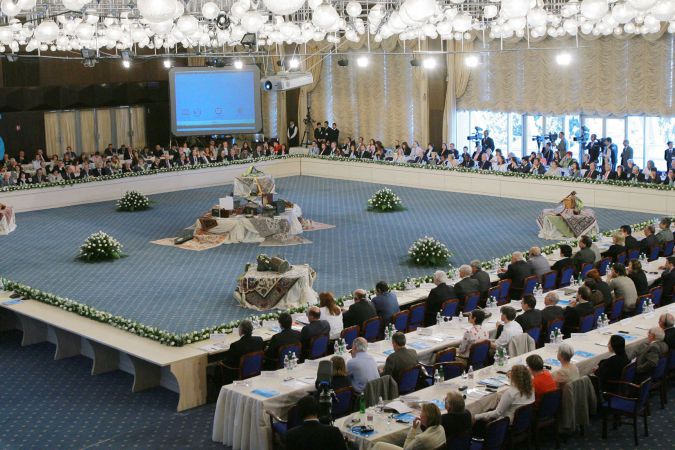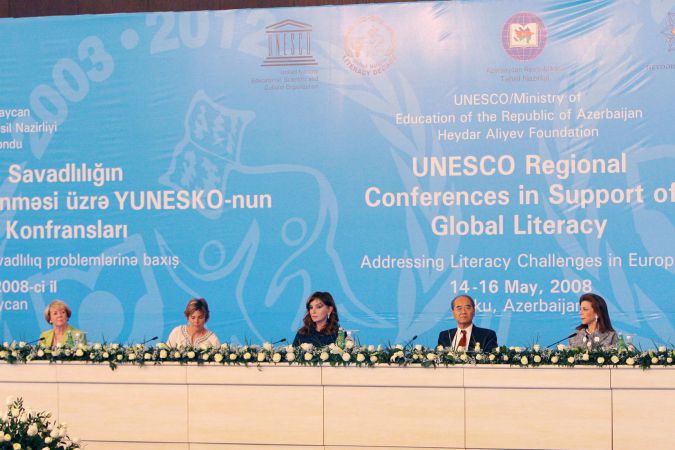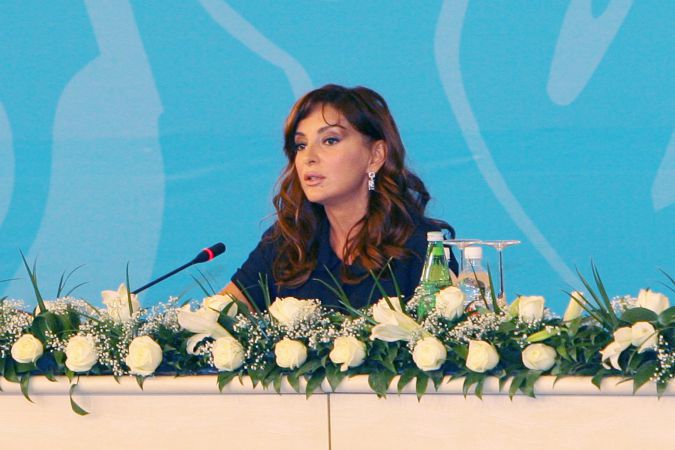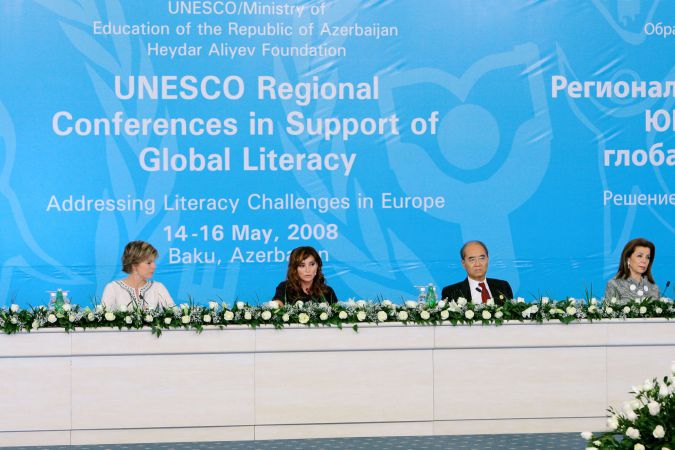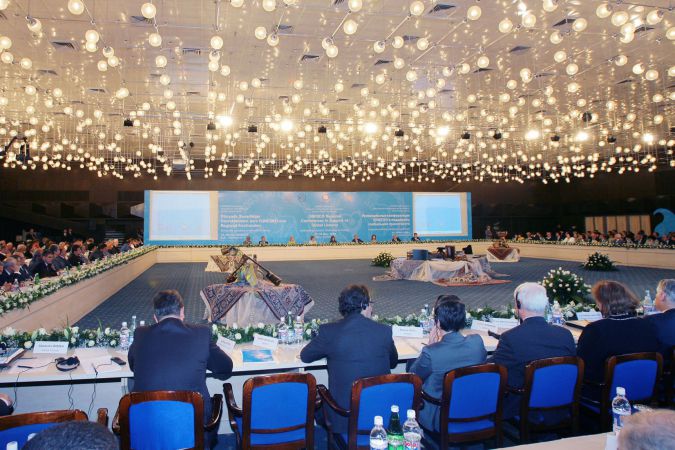September 25, 2008
The Conference “Addressing Literacy Challenges in Europe with Sub-Regional Focus: Building Partnerships and Promoting Innovative Approaches”
May 14, 2008
The UNESCO Conference “Addressing Literacy Challenges in Europe with Sub-Regional Focus: Building Partnerships and Promoting Innovative Approaches” has started in Baku on May 14 at the Gulustan Palace, within the framework of the series of UNESCO`s Regional Conferences for Support to Literacy in the World.
The conference, which is organized by UNESCO, Heydar Aliyev Foundation and Ministry of Education of Azerbaijan on the initiative of Mrs Mehriban Aliyeva, President of the Heydar Aliyev Foundation, UNESCO and ISESCO Goodwill Ambassador, MP, is being held in Azerbaijan. The event is attended by Director General of UNESCO Koichiro Matsuura, Princess Laurentien of the Netherlands, UNESCO Goodwill Ambassadors Princess Firyal of Jordan and former president of Iceland Vigdis Finnbogadottir, as well as education ministers and experts from a number of countries, Azerbaijani government officials, foreign ambassadors in Baku.
An exhibition on the United Nations Literacy Decade was also organized at the Gulustan Palace. The exhibition featured old books including Koran, which was used in schools and religious schools as an educational supply from VIII century to early XX century, ancient books and new educational supplies used in Azerbaijan, encyclopedias, dictionaries and alphabet books of different years, totally 18 various ancient books and 183 educational supplies.
The conference, covering 31 European countries, started with opening remarks of Mr Samad Seyidov, Chairman of the Milli Majlis Standing Commission on International Relations and Interparliamentary Ties, Head of the Azerbaijan Delegation to the PACE.
Chief of the Presidential Administration`s Department for Humanitarian Policy Fatma Abdullahzadeh read out President of Azerbaijan Ilham Aliyev`s congratulatory message.
First Lady of Azerbaijan, President of the Heydar Aliyev Foundation Mehriban Aliyeva made her remarks at the opening of the conference.
The conference was continued on May 15. Round Table ‘Concept of literacy in the modern world, its development and adult training’ was held first. Opening the discussions Director of the UNESCO Lifelong Education Institute Adama Owen said major attention will be directed to the idea of literacy in Europe, its development, adult education in the prospect of lifelong learning. Views said will be used in making of policies and strategies. It will help all the members of the society obtain major skills and inspire development. Taking into consideration the state of literacy in European countries, much more attention is paid now to adult literacy programmes. Noting extra skills are required to have a successful and responsible life, take an effective part in the society, meet requirements of the modern time and future A.Owen said on this point main objective of literacy and adult training is development of main skills of individuals for assessment, management, integration and mutual influence. Certainly, these skills do not include cognitive components such reading, writing, scientific literacy, mathematic knowledge, language skills. However, rapid social and technological changes, globalization of economy and culture, growth of diversity, competition and liberalization, social inequality, conflicts and all forms of poverty demand people to have such skills that go beyond the frame of the technical communication skills. Potential fruits of skills assure successful participation of people in labor market, political processes and social networks. As the fundamental human right the literacy is not objective but a means for active participation in individual and public life, interference in social life, economic and humanitarian development, as well self-confidence and decision-making.
UNESCO expert Aaron Benavot, Director of the Netherlands Writing and Reading Foundation Margaret de Vrays, President of European Adult Education Association Yanosh Yigeti Tot, Representative of the European Commission Education and Culture Department Marta Ferreira addressed the Round Table, informed of studies implemented by bodies they represent and their results. They mentioned definition of the idea of literacy in EU countries is different. But requirements for adequate literacy to cope with personal, public and economic problems are the same.
It was noted there are 80 mln low-educated workers in Europe and they form the one third of total workforce. According to calculations, till 2010 people with primary education will be able to work only in 15% of workplaces to be created. 50% of workplaces will require high-qualified employees. This situation brings to violation of rights of a lot of people in EU countries. Modern labor market offers too limited amount of workplaces for people with low literacy. To assure actual possibility of possession of every person of market skills is one of major issues of the Education and Training Work Programme of Education Board till 2010. Assurance of opportunity of lifting and approving market skills of adults in Europe is one of themes of the Adult Education Action Plan of European Commission.
Questions of participants were in detailed replied in the Round Table, views were exchanged on the theme.
After the break, the conference was continued by discussions in working groups on the themes ‘Literacy in the family and intergeneration learning’ under chairmanship of UNESCO Goodwill Ambassador, Princess Firyal of Jordan, ‘Literacy and education for sustainable development’ under chairmanship of UNESCO Goodwill Ambassador Mrs Vigdos Finnbogadottir and ‘Literacy in health care’ under chairmanship of representative of Rotary International Orschelik Balkan.
The same day second Round Table ‘Definition and valuation of literacy levels and basis skills’ was held under chairmanship of Deputy Director General of UNESCO Nicholas Boernet.
Nicholas Boernet underlined modern criteria for valuation of literacy direct attention not only to registration of participants of the school and literacy programs but also to assessment of different levels and types of skills, application of skills in everyday life. Such skill is directed from finding out skills and habits of person required for writing and reading to the study of the skill of being correctly directed in modern scientific societies. So, it is not enough to speak only of literate-illiterate position in assessment of literacy, other details must be taken into consideration too. Valuation of the level of literacy must assure access of different groups of population to information on their need for education.
Representative of Canada Statistics Department Ivan Clermont, Andres Kangro from Latvia, Jean Pierre Jeanto from France, Marina Kuznetsova from Russia, Ireneush Bialetsky from Poland talked in the Round Table about the theme, shared their experience on development and use of assessment of literacy. They gave samples from results of valuation carried out in sub-regions, talked of use of literacy programmes in identification of policy and action frame, extra information required, discussed future international and domestic plans for creation and use of information on assessment of literacy in Europe.
The conference ended on May 16. The conference was continued in the first half of the day by Round Table ‘Pedagogical approaches: Development of high quality basis training’.
Opening the discussions Director of UNESCO Moscow Office Marc Richmond said the first condition to assure the high quality primary education is literacy, specialists well trained by adult primary education and professional training programs. But in many cases training is held shortly and superficially. Another necessary issue is the lesson program. To make high quality lesson programs the needs of pupils must be analyzed first.
Making speech on the theme ‘Study on adult literacy pedagogy: National study and training center for teaching adults writing, reading and computing’ John Vorhauz from England said quality of learning and fruitful use of pedagogical experience must be considered as the major factors in removal of illiteracy. According to him, studies conducted in 2001 among those learning English as the second language showed that methods of learning must include modern elements to assure success in this field for short time.
Director of Hamburg Institute of Adult Education Nusl fon Ekkekhard, Eva Prjibilska from Poland talked of importance of realization of various projects to pout an end to illiteracy, assure rapider integration of people, also migrants into the society.
Dean of the English Language Faculty of Azerbaijan Languages University Afgan Abdullayev delivered speech on methods used to assure high quality learning. To him, Azerbaijan is in the 15th place among 177countries for degree of literacy of people aged above 15.
The second Round Table, which was led by delegate of the Council of Europe Caesar Birze, was themed ‘Meeting the new requirements and creation of the integrated training opportunities systems’. President of Adult Education Association Federation of Serbia Katarina Popovich, Lorenz Lassnig from Austria, Deputy Director of Adult Education Federation of Switzerland Rut Jermann, Victor Bolotov from Russia gave speech in the Round Table.
In his presentation themed ‘Opportunities of education directed to stable results for refugees and IDPs: Cooperation of governmental, non-governmental organizations and private sectors’ Academician of the National Academy of Sciences of Azerbaijan Urkhan Elekberov emphasized services of Heydar Aliyev Foundation in fighting the illiteracy in the country, mentioned huge importance of literacy for promotion of democracy.
Speakers stressed necessity for wide approach to the illiteracy problem, noted main guarantors in realization of literacy must be state and NGOs. Major problem in European countries is lack of the coordinated system for education opportunities. Solution of illiteracy problem will stimulate firm cooperation among European countries.
Deputy Director General of UNESCO for Education Nicholas Boernet expressed gratitude to Mrs Mehriban Aliyeva, President of the Heydar Aliyev Foundation, UNESCO and ISESCO Goodwill Ambassador, for support to the conference.
Final recommendations of the conference were adopted, necessity for propaganda of them all over the world underlined.
Addressing the ceremony of closing of the conference Education Minister of Azerbaijan Misir Merdanov expressed gratitude to UNESCO and Heydar Aliyev Foundation. Noting big importance of the conference for Azerbaijan the Minister said the event will inspire further improvement of education reforms carried out in the country.



